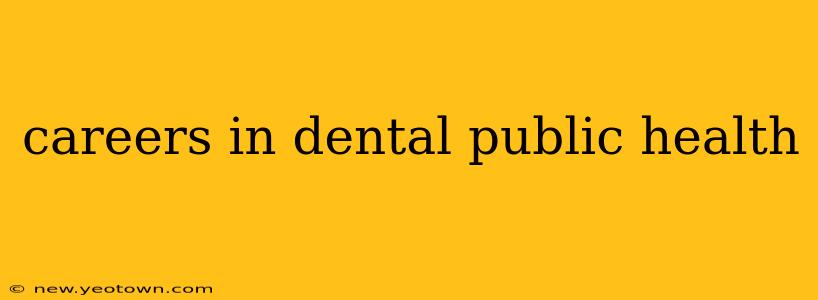The satisfying click of a dental instrument, the relieved sigh of a patient—these are images often associated with dentistry. But the world of dental public health offers a different, equally rewarding perspective. It's a field brimming with opportunities to make a real difference in communities, improving oral health on a larger scale. Forget the individual patient in a private practice chair; imagine impacting entire populations, transforming the oral health landscape, and advocating for better care for all. This is the exciting realm of dental public health. Let's explore the diverse and impactful career paths it offers.
What is Dental Public Health?
Before diving into specific roles, it's crucial to understand the core of dental public health. It's not simply about treating individual patients; it's about preventing diseases and improving oral health outcomes for entire populations. This involves a multi-faceted approach, incorporating research, education, policy, and community outreach to address the social determinants of oral health – factors like poverty, access to care, and education levels that significantly influence oral health outcomes.
What are the Different Career Paths in Dental Public Health?
The beauty of dental public health lies in its versatility. There's a role for everyone, regardless of their background or area of expertise.
1. Public Health Dentist:
This is arguably the most common role. Public health dentists are at the forefront of designing and implementing community-based oral health programs. They might conduct epidemiological studies to identify health trends, develop and deliver oral health education initiatives in schools and community centers, or advocate for policy changes that improve access to care. Imagine working on a project to reduce childhood caries rates in a low-income neighborhood—that's the kind of impact you'd have as a public health dentist.
2. Dental Hygienist in Public Health:
Dental hygienists play a crucial role in prevention and education. They often work alongside public health dentists, providing hands-on care in community settings, conducting screenings, and teaching proper oral hygiene practices. They're the boots on the ground, delivering essential services and building trust within communities.
3. Dental Public Health Researcher:
For those with a passion for data and scientific inquiry, a research-focused career path is incredibly fulfilling. This involves designing and conducting studies to investigate oral health disparities, test new prevention strategies, or evaluate the effectiveness of existing programs. Their findings inform policy decisions and shape the future of oral health care.
4. Dental Public Health Administrator:
This involves managing and overseeing public health programs. These professionals are skilled in budget management, program planning, and personnel management, ensuring the smooth and efficient operation of community-based oral health initiatives.
5. Oral Health Policy Analyst:
Policy analysts use their expertise to influence oral health policy at local, state, and national levels. They analyze data, identify gaps in services, and advocate for policy changes that improve access to care and reduce health disparities. Their work directly influences the resources and support available to communities.
How Can I Get Involved in Dental Public Health?
So, you’re inspired to make a difference? Here's how to start your journey:
- Earn a Dental Degree (DDS or DMD): While not strictly required for every role, a dental degree is crucial for positions like public health dentist.
- Pursue a Master's in Public Health (MPH): An MPH degree is highly beneficial, providing the necessary public health expertise and skills.
- Consider a Residency in Dental Public Health: This specialized training program provides advanced knowledge and practical experience in public health dentistry.
- Network: Attend conferences, join professional organizations, and connect with professionals in the field. Networking is invaluable for finding opportunities and mentorship.
What are the Educational Requirements for a Career in Dental Public Health?
The educational path varies depending on the specific career you choose. Generally, a dental degree (DDS or DMD) is necessary for roles directly involving dental treatment or supervision. Many public health roles also benefit from a Master's in Public Health (MPH) or a related field, enhancing skills in research, epidemiology, policy, and program management. Specific training and licensure requirements will depend on the individual role and jurisdiction.
What is the Job Outlook for Dental Public Health Careers?
The job outlook for dental public health careers is generally positive. Growing awareness of the importance of oral health and the increasing need to address health disparities fuel demand for qualified professionals. The field also presents opportunities for career growth and advancement into leadership and administrative roles.
What are the Salaries and Benefits for Dental Public Health Careers?
Salaries vary depending on the role, experience, and location. Public health positions often offer competitive salaries and benefits packages, including health insurance, retirement plans, and paid time off.
Embarking on a career in dental public health is not just about a job; it's about a mission. It's about contributing to healthier communities, improving lives, and leaving a lasting legacy of better oral health for generations to come. The opportunities are vast, and the rewards are immeasurable. Are you ready to make a difference?

